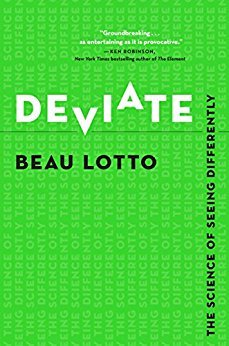More on this book
Community
Kindle Notes & Highlights
by
Beau Lotto
Read between
December 26 - December 29, 2017
Your assumptions (i.e., the connectivity between brain cells that is your history) determine the boundaries and everything that falls within—and hence the structure and dimensionality of your space of possibility.
As a species, humans evolved in a cooperative context in which survival depended on how well we got along and worked with others, and as we all know, getting along with others is often easier if you don’t disagree with them. Because of this, our brain developed a bias toward conformity, and this non-blank-slate quality (assumption) with which we each come into the world affects perception.
Dee liked this
And in knowing less, you (and we) now have the opportunity to understand more. Without this step of understanding, every decision you make in the future will remain a response grounded in history… for better or worse. There will not be any choice in the matter, despite the narrative your brain tells itself. Choices exist where there is an option. Understanding why you see what you do provides that option. It gives you the potential of choice, and therein the potential for intention.
Seeing differently—to deviate—begins with awareness… with seeing yourself see (but by no means ends there). It begins with knowing that some of those often invisible assumptions that maintained your survival in the past may no longer be useful. It begins with understanding that they may in fact be (or become) bad for you (and others), and if not changed would curtail living. To truly embody this is to empathize with what it is to be human… indeed, with what it is to be any living, perceptual system.
We change our future by changing our past. As strange as it may sound, this is entirely possible. As a matter of fact, it’s what we do all the time. Every story, every book, all narratives spoken, read, or enacted are about changing the past, about “re-meaning” past experiences, or more specifically, about changing the future past.
Hence, innovators begin the process of creating new perceptions—of changing their future past—by asking why not just of anything, but of what we assume to be true already… our assumptions. Arguably, to question your deep assumptions, especially those that define you (or your relationships or society), is the most “dangerous” thing you can do, as it has the greatest potential to lead to transformation and destruction in “equal” measure.
Dee liked this


